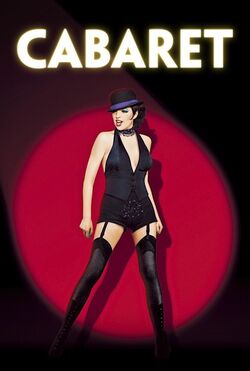
Cabaret.
This is about the film. For the original musical see Cabaret (musical).
Cabaret is a 1972 film based on the stage musical of the same name.
Cast[]
Singing roles[]
- Liza Minnelli - Sally Bowles
- Joel Grey - Emcee
- Mark Lambert - Nazi Youth (singing voice)
- Greta Keller - Singer on Gramophone
Non-singing roles[]
- Michael York - Brian Roberts
- Helmut Griem - Maximilian von Heune
- Fritz Wepper - Fritz Wendel
- Marisa Berenson - Natalia Landaeur
- Elisabeth Neumann-Viertel - Fraulein Schneider
- Helen Vita - Fraulein Kost
Plot[]
In 1931 Berlin, young American Sally Bowles performs at the Kit Kat Klub. A new British arrival in the city, Brian Roberts, moves into the boarding house where Sally lives. A reserved academic and writer, Brian gives English lessons to earn a living while completing his doctorate. Sally tries seducing Brian and suspects he may be gay. Brian tells Sally that on three previous occasions he has tried to have physical relationships with women, all of which failed. They become friends, and Brian witnesses Sally's anarchic, bohemian life in the last days of the German Weimar Republic. Sally and Brian become lovers despite their earlier reservations; they conclude that his previous failures with women were because they were "the wrong three girls".
Sally befriends Maximilian von Heune, a rich playboy baron who takes her and Brian to his country estate; it becomes ambiguous which of the duo Max is seducing. After a sexual experience with Brian, Max loses interest in the two and departs for Argentina. During an argument, when Sally tells Brian that she has been having sex with Max, Brian reveals that he has as well. Brian and Sally later reconcile, and Sally reveals that Max left them money and mockingly compares the sum with what a professional prostitute gets.
Sally learns that she is pregnant, but is unsure of the father. Brian offers to marry her and take her back to his university life in Cambridge. At first they celebrate their resolution to start this new life together, but after a picnic between Sally and Brian in which Brian acts distant and uninterested, Sally starts to doubt continuing with the pregnancy, and is disheartened by the vision of herself as a bored faculty wife washing dirty diapers. Ultimately she has an abortion, without informing Brian in advance. When he confronts her, she shares her fears and the two reach an understanding. Brian departs for England and Sally continues her life in Berlin, embedding herself in the Kit Kat Klub, but the final shot shows men in Nazi uniforms in the front row of the club.
A subplot concerns Fritz Wendel, a German Jew passing as a Christian, who is in love with Natalia Landauer, a wealthy German Jewish heiress who holds him in contempt and suspects his motives. The worldly Sally gives advice which eventually enables Fritz to win her love. However, in order to get her parents' consent for their marriage, Fritz must reveal his true religious and ethnic background – a highly dangerous act considering what is in store for Jews under the coming Nazi regime. Although the Nazis are not yet in power, some of them kill Natalia's beloved dog one night.
The Nazis' violent rise is a powerful, ever-present undercurrent in the film. Their progress can be tracked through the characters' changing actions and attitudes. While in the beginning of the film National Socialist members are sometimes harassed and even kicked out of the Kit Kat Klub, the final shot of the film shows the cabaret's audience is dominated by Nazi party members. The rise of the Nazis is also dramatically demonstrated in the rural beer garden scene. In a sunlit outdoor setting a boy — only his face seen — sings to a relaxed audience of all ages what at first seem mild lyrics about the beauties of nature and youth. The camera shifts to show that the singer is wearing a brown Hitler Youth uniform. He lifts his hand in the Nazi salute as the accompanying music becomes all-powerful. One by one, nearly all the adults and young people watching are inspired and rise to join in the singing and saluting, the gentle acapella ballad gradually transforming to a compelling patriotic anthem. Max and Brian return to their car after witnessing this show of growing support for the Nation Socialist movement, Brian asking Max "Do you still think you can control them?". Later, Brian's one-man confrontation with a Nazi in the street is a futile gesture, leading to nothing but him being beaten up.
While he does not play a role in the main plot, the “Master of Ceremonies” serves in the role of storyteller throughout the film. His surface demeanor is one of benevolence and hospitality, but his intermittent songs in the Kit Kat Klub are increasingly risqué and pointedly mock the Nazis initially, while later songs reveal the growing acceptance of anti-semitism.
Musical numbers[]
- "Willkommen" - Emcee
- "Mein Herr" - Sally
- "Maybe This Time" - Sally
- "Money, Money" - Emcee and Sally
- "Two Ladies" - Emcee
- "Tomorrow Belongs to Me" - Nazi Youth
- "Tiller Girls" - Emcee
- "Heiraten (Married)" - Singer
- "If You Could See Her" - Emcee
- "Cabaret" - Sally
- "Finale" - Emcee